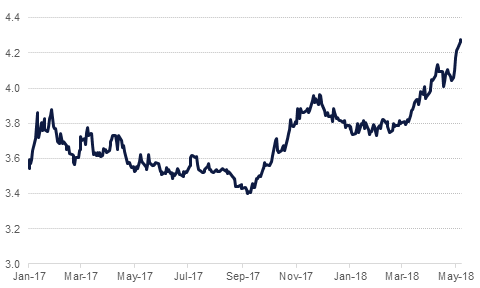
US president Donald Trump is set to announce today whether or not he will abide by the terms of the JCPOA, the Iran nuclear deal. Mr Trump faces a deadline of May 12 on whether to renew waivers on sanctions on companies dealing with Iran. Several European delegations from countries that are party to the deal appear to have failed to convince Mr Trump to remain in the deal. A return of US sanctions could severely disrupt Iranian oil flows which have more than recovered since 2016 when the JCPOA came into effect.
Turkey’s central bank lowered the threshold for foreign exchange to count as reserve requirements in an effort to stop the ongoing rout of the lira which hit record lows against the dollar last week. The cut in the upper limit of the forex maintenance facility from 55% to 45% will serve to mop up lira liquidity in the market while providing as much as USD 2.2bn into the banking system. The central bank last cut the upper limit of the forex facility in November when it lowered it from 60% to 55%.
Factory orders in Germany fell for a third month running in March. Total orders fell 0.9% compared with market expectations for an increase of 0.5%. Germany’s economy is highly export-oriented and growing concerns about international trade will likely have weighed on demand for capital goods; foreign orders of industrial goods dropped 2.6%. The relative strength of the euro in Q1 likely also helped price-out Germany products.
More evidence of a soft Q1 in developed markets emerged this morning with Japanese household spending declining 0.7% year on year, its second straight month of declines. Income also dipped, falling by 3.8% y/y, its third consecutive month of decline. Overall consumption data in Japan appears to be quite soft, casting a shadow over the Bank of Japan’s ambitions to get inflation back to its target level of 2%. Market consensus expects that Japan’s economy will have grown by 0.5% y/y in Q1.
Saudi Arabia’s fiscal position has reaped the benefits of the introduction of VAT in January as non-oil revenues increased 63% y/y to SAR 52.3bn. The total fiscal balance stood at a deficit of SAR 34.3bn compared with a 2018 projection of SAR 195bn. Higher than anticipated oil prices will also help to narrow the budget gap in Saudi Arabia, accommodating an 18% increase in spending in the first three months of the year.

Treasuries remained in a narrow range amid lack of economic data releases. Yields on the 2y UST, 5y UST and 10y UST closed flat at 2.49%, 2.78% and 2.94% respectively.
Regional bonds too remained largely unchanged with the YTW on the Bloomberg Barclays GCC Credit and High Yield index closing flat at 4.61% and credit spreads tightening by 1bp to 187 bps.
The Ministry of Finance in Saudi Arabia said that Q1 2018 budget deficit stood at SAR 34.3bn compared to SAR 26.2bn at the end of Q1 2017. Revenues for the government grew 12.3% y/y to SAR 166.2bn. Saudi government USD bonds remained largely unchanged with KSA 25s closing at USD 98.39 and KSA 21s at USD 95.83.
In terms of rating action, S&P downgraded Al Baraka Banking Group to BB from BB+. The outlook is stable. The rating agency said that the downgrade reflected its view that the bank’s capitalization is a perceived weakness due to large operations in Turkey.
AUD is underperforming this morning in the aftermath of softer than expected economic data. A report from Australian Bureau of Statistics showed that retail sales were unchanged in March, following a 0.6% m/m growth the previous month, missing out expectations for 0.2% growth. As we go to print, AUDUSD is trading 0.27% lower at 0.74968, poised to fall for a second day. We anticipate the next level of support to come in 0.74. Should the daily candle close below 0.7519 (the 23.6% one year Fibonacci retracement) the risk of further declines is significant.
Developed market equities closed higher as oil prices continued their rally. The S&P 500 index added +0.4% while the Euro Stoxx 600 index gained +0.6%.
It was a mixed day of trading for regional equities. The DFM index lost -0.3% while the Qatar Exchange added +0.9%. Emaar Properties (-3.1%) continued to lag behind the market. After the market closed, DFM reported net income of AED 48.9mn for Q1 2018, a decline of 52.2% y/y. The stock rallied +4.6% in regular market hours.
Oil prices were up strongly to start the week on news that US president Donald Trump would announce as early as today whether he will stick to the terms of the Iran nuclear deal or not (see macro above). Brent futures closed up 1.74% and WTI held its level above USD 70/b and closed up 1.45%.
Saudi Arabia’s energy minister Khalid al Falih commented yesterday that he was concerned about the tight level of spare capacity in oil markets. This would further his case that more investment is needed in oil production in order to avoid price shocks. Saudi Arabia is one of the few countries with ample spare capacity available but ongoing upstream investment in other GCC producers, namely the UAE and Kuwait, should help to widen the pool of producer nations available to step in to balance markets on short notice.